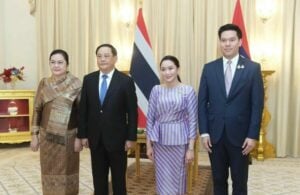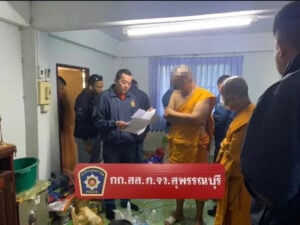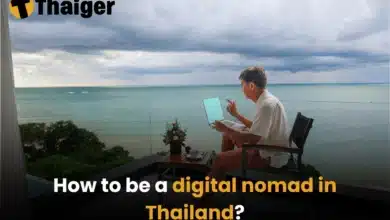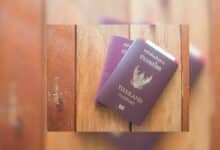Thailand launches eco, astro, and digital nomad visas for 2024 travellers

As you plan your upcoming trip to Thailand in 2024, staying updated on the changing visa regulations with careful attention and a positive outlook is crucial. Whether you’re a seasoned traveller or making your first visit to the Land of Smiles, knowing the latest tourism visa requirements is key. The range of regulations spans from unique rules that may provoke amusement to stringent requirements that necessitate thorough attention, reflecting the diverse nature of Thailand’s visa framework.
Thailand, renowned for its stunning landscapes, rich cultural heritage, and dynamic urban life, also presents a distinctive array of visa policies that epitomize its hospitable yet orderly stance towards tourists. Delving into the specifics of securing entry into the country reveals aspects as captivating as Thailand’s famous night markets and tranquil beaches.

This guide aims to demystify the complexities surrounding Thailand’s visa trends for 2024 by shedding light on both amusing peculiarities and critical details vital for travellers. Whether your interest lies in anecdotal tidbits or practical guidance, this resource is designed to ensure your visit to Thailand remains both unforgettable and seamless. Let us proceed together through this detailed exploration of Thailand’s visa prerequisites, approaching each step with clarity and an occasional dash of levity.
Latest visa trends: The shifts to watch in Thailand
The rise of eco-tourism visas
Get ready because, in 2024, Thailand is rolling out some cool eco-tourism visas. They’re all about bringing in folks who love sustainability as much as they do. So if you’re into visiting green initiatives and national parks, this one’s for you. They aim to promote conservation efforts and environmentally responsible travel. By choosing an eco-tourism visa, you’re contributing to Thailand’s green initiatives, aligning fun and responsibility seamlessly.
Introduction of Astro-tourism and its impact
Astro-tourism, a blend of astronomy and travel, gains momentum in Thailand. The country’s clear skies in certain areas, like Doi Inthanon and Koh Tao, become key attractions. Thailand’s introduction of astro-tourism visas caters to stargazers and space enthusiasts. This move puts Thailand on the map as a premier destination for astronomical observations, attracting a niche group of travellers.
Home swapping and long-term visas
Thailand jumps on the home-swapping trend, facilitating cultural exchanges and longer stays. Coupled with long-term visas, this trend allows you to live like a local, exploring Thailand beyond the tourist traps. It’s a serious shift towards immersive travel experiences, offering an in-depth understanding of Thai culture and lifestyle.
The advent of digital nomad visas

Thailand has formally acknowledged the digital nomad lifestyle by introducing dedicated visas. These visas establish a legal foundation for remote workers to reside and operate in Thailand, thereby elevating its status as a worldwide work hub. This initiative underscores Thailand’s recognition of the evolving employment landscape, presenting an equilibrium between professional duties and leisure in a tropical setting.
Funny and serious facts about Thailand and visas
The world’s longest city name and its visa office
You might find it amusing that the full name of Bangkok, Krung Thep Mahanakhon Amon Rattanakosin Mahinthara Ayuthaya Mahadilok Phop Noppharat Ratchathani Burirom Udomratchaniwet Mahasathan Amon Piman Awatan Sathit Sakkathattiya Witsanukam Prasit, holds the record for the world’s longest city name. When applying for a visa at local offices, officials operate under the city’s abbreviated moniker, Bangkok, simplifying documents and communications. This contrast between formal and casual name usage presents a curious fact for newcomers and applicants alike.
Celebrating the new year three times: Visa validity extensions?
Thailand offers a unique experience with the possibility to celebrate New Year three times. Thanks to the Gregorian calendar, the Chinese New Year, and the Thai New Year (Songkran), are observed in April. However, don’t expect visa validity extensions to align with these festivities. Visa policies remain unchanged irrespective of the triple celebrations. This scenario showcases Thailand’s blend of tradition and regulation, offering both fun and serious insights into its cultural and bureaucratic landscape.
The quirky side of Thai visa applications
Thai visa applications occasionally reveal curious requests, ranging from applicants inquiring about bringing pets on tourist visas to questions about visa eligibility for meditation retreats. Thai authorities handle each request with a blend of professionalism and flexibility, reflecting the country’s accommodating nature. These quirky inquiries underscore the diverse reasons people visit Thailand, blending fun facts with the serious task of visa processing.
Thailand’s approach to AI and visa processing
In a move that straddles the line between serious and futuristic, Thailand has begun experimenting with artificial intelligence (AI) in streamlining visa processing. This initiative aims to reduce wait times and improve accuracy in application assessments. While the implementation of AI in visa processes might sound like something out of a sci-fi novel, it’s a testament to Thailand’s commitment to adopting innovative solutions to meet the challenges of modern tourism and immigration.
Cultural nuances and visa policies
The Colour for every day of the week and its visa significance

In Thailand, colours hold significant cultural value, influencing even the realms of visa policies. Each day of the week corresponds to a specific colour, reflecting traditional Thai beliefs. This cultural nuance, while subtle, plays a role in the design and issuance of certain visa documents and promotional materials. For instance, document colours and visa campaign themes often align with these cultural beliefs to resonate more deeply with the local populace. Understanding these colour codes can enhance your grasp of Thai culture and make your visa application process more insightful.
Spirit houses and their place in Visa lore
Spirit houses, prevalent across Thailand, embody the nation’s spiritual heritage. These miniature shrines, found outside businesses and homes, are believed to provide shelter to spirits. Interestingly, their significance extends into the realm of visa lore. Applicants sometimes seek blessings at spirit houses, hoping for a favourable outcome. While there’s no formal link between spirit houses and visa policies, this practice underlines the deep intertwining of cultural beliefs and daily activities in Thailand, including the journey of securing a visa.
Monastic stays: A special visa category?
Monastic stays represent a unique intersection of tourism and spirituality in Thailand. Recognising this, Thailand introduced a special visa category facilitating extended stays for those wishing to engage in religious studies or meditation retreats in monasteries. This visa category underscores Thailand’s commitment to preserving its religious heritage while opening its doors to cultural exchange. It caters specifically to individuals seeking not just a visit, but a profound immersion in the country’s spiritual life, highlighting a blend of fun facts and serious information amidst Thailand’s visa trends.
Local Impact and Opportunities
Economic Boost
The introduction of the Eco, Astro, and Digital Nomad Visas is poised to significantly enhance Thailand’s economy. By attracting eco-conscious travellers, space enthusiasts, and digital nomads, Thailand stands to benefit from increased tourism revenue. This influx of visitors can stimulate various sectors, including hospitality, retail, and services, leading to the creation of new job opportunities and economic growth.
Sustainable Development
The Eco Visa aligns seamlessly with Thailand’s commitment to sustainable development. By promoting eco-friendly travel and conservation efforts, this visa helps ensure the preservation of Thailand’s natural beauty for future generations. Eco Visa holders often participate in environmental conservation projects, furthering the country’s sustainability goals and raising awareness about ecological issues.
Innovation and Education
The Astro Visa supports Thailand’s aspirations to become a hub for space tourism and education. By attracting space enthusiasts and professionals, Thailand can foster innovation and advance its space science initiatives. Educational programs, workshops, and seminars related to astronomy can inspire local students and contribute to the country’s scientific community.
Remote Work Hub

The Digital Nomad Visa positions Thailand as a premier destination for remote workers. With its affordable cost of living, modern infrastructure, and vibrant cultural scene, Thailand is an ideal location for digital nomads. This visa can attract a growing community of remote workers, contributing to local economies, enhancing cultural exchange, and fostering a dynamic, international community.
Challenges and Considerations
Infrastructure
To accommodate the influx of new visa holders, Thailand will need to invest in infrastructure. This includes developing eco-friendly accommodations, co-working spaces, and space tourism facilities. Enhancing transportation networks and internet connectivity will also be crucial to support the needs of eco-tourists, space enthusiasts, and digital nomads.
Regulatory Compliance
Ensuring that visa holders comply with local laws and regulations is vital. The Thai government must establish clear guidelines and robust monitoring mechanisms to prevent misuse of the visas. This includes setting criteria for visa eligibility, regular checks on visa holder activities, and stringent enforcement of immigration laws.
Environmental Impact
While promoting eco-tourism is beneficial, managing the environmental impact of increased tourism is essential. Sustainable practices and conservation efforts must be prioritized to protect Thailand’s natural resources. This includes implementing eco-friendly policies, promoting responsible tourism, and engaging in continuous environmental monitoring and protection initiatives.
Integration and Support
Providing adequate support services for visa holders is crucial for their successful integration into Thai society. This includes offering language assistance, legal advice, and cultural orientation programs. Establishing support networks and community groups can help new arrivals adapt more easily and foster a sense of belonging.
Facing a Thai visa denial can be disheartening, but it’s not the end of the road. By understanding the reasons behind the rejection, addressing them directly, and meticulously preparing your next application, you can turn a denial into an approval, opening the door to your Thai adventure.

































